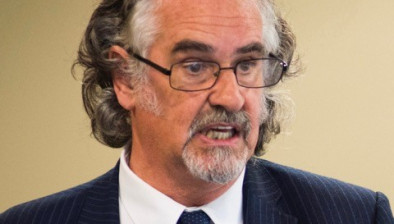Landlords reaffirm commitment to avoiding evictions

Private and social landlords have signed new joint statements reaffirming their commitment to only take eviction action as a last resort.
The statements have been agreed by the Scottish Federation of Housing Association (SFHA), the Glasgow and West of Scotland Forum of Housing Associations (GWSF) and COSLA, as representatives of social landlords. The Scottish Association of Landlords has signed as a representative body for private landlords.
Housing secretary Shona Robison said the joint statements are another step to support tenants facing difficulties during the pandemic.
The move follows last week’s announcement by Deputy First Minister John Swinney of a £10 million grant fund to support tenants struggling to pay their rent as a direct result of Covid-19, taking the Scottish Government’s total support for tenants during the pandemic to almost £39m.
Ms Robison said: “We have been clear from the outset that eviction action must be an absolute last resort, when all other avenues have been exhausted and a tenancy is no longer sustainable, so I welcome these joint statements from across the rental sector.
“The actions already taken by the Scottish Government, local authorities, housing associations and private landlords have been essential to avoiding evictions. Our new £10m grant fund to support those who are struggling to pay their rent will shore up these efforts and extend more support to those facing crisis due to the pandemic. We will work towards making the grant fund available later in the year, and we will work with stakeholders over the coming weeks to develop the details.
“Paying rent is an important tenant responsibility, and tenants in financial hardship should engage directly with their landlord. When landlords are flexible with their tenants, signposting them to the range of financial support that is available and coming to agreements to prevent and manage rent arrears, this sustains tenancies and keeps people in their homes, benefitting everyone. These actions are crucial to move towards a sustainable and fair recovery from the impact of COVID-19.”
In line with increased support already offered during the pandemic, the social housing shared statement maintains that eviction from homes managed by social landlords is only considered as a last resort, primarily for cases where there has been:
- Evidence of anti-social behaviour; criminality or deliberate avoidance of paying rent which has been tested in court.
- A long standing history of failure to pay rent, extending before the pandemic.
- A persistent failure to respond to the landlord’s attempts to contact and support the tenant to pay their rent.
Social landlords will also continue to support tenants who are struggling through no fault of their own to manage when they fall behind in their rent, and will act compassionately and quickly to keep people in their homes and offer the support they need to stay there.
For those put on furlough, or where there has been a loss of income or employment, social landlords will offer support to apply for and access appropriate financial support and work with tenants to agree a plan to get rent payments back on track in a way that is manageable for the household.
The statement assures that no one will be evicted from a local authority, housing association or co-operative home because of financial hardship when they are engaging with their landlord, have agreed a way to repay rent payments, and are keeping to the arrangement they have made.
Cllr Kelly Parry, COSLA community wellbeing spokesperson, said: “Local authorities have worked closely with tenants during the public health crisis, to support them to stay in their homes. This is something we were doing previously, but became even more important as our homes became even more important to us over the months of the pandemic. I am glad to see the sector restate their commitment to support tenants, and would encourage any tenant facing financial challenges to work closely with their landlord and seek advice and guidance early.”
Sally Thomas, Scottish Federation of Housing Associations chief executive, added: “Housing associations and co-operatives have always worked hard to help tenants who are struggling to pay their rent through tenancy sustainment services. This includes support to access benefits, budgeting advice, hardship funds and employability services – and this work has increased during the pandemic. They arrange manageable payment plans for tenants in rent arrears and will never evict someone who has agreed to, and is meeting, the conditions. Every effort is made to keep people in their homes.
“Any tenant who is struggling financially should contact their housing association or co-operative for support and help in paying rent.”
Where a private tenant has suffered financial hardship because of the coronavirus pandemic, the private housing shared statement also confirms that eviction action should be an absolute last resort, when all other avenues have been exhausted and a tenancy is no longer sustainable.
The statement advises that private landlords and letting agents continue to work to the following principles – for the remainder of the pandemic and throughout recovery:
- Intervene early to keep people in their homes and give them the support they need to stay there
- Landlords and letting agents should work with tenants who are struggling and support them to make arrangements to pay rent through a plan that is manageable for them in the long term
- All landlords and letting agents should be flexible with their tenants, signposting them to the range of financial support that is available to help prevent rent arrears as part of the pre-action protocols required prior to any eviction application to the Tribunal or Sheriff Court.
- Landlords and letting agents should act compassionately and quickly to support people who are in financial hardship and wish to work with their landlord to reduce arrears.
John Blackwood, Scottish Association of Landlords chief executive, said: “The overwhelming majority of tenants and landlords are working together to sustain tenancies during the pandemic. We welcome the Scottish Government emphasising that tenants have a responsibility to pay their rent, and encourage landlords to work with their tenants and always treat eviction action as a last resort. Our members have been working closely with tenants to reduce rents and write off arrears wherever possible.
“We strongly welcome the £10 million grant fund the Scottish Government has announced to help ensure tenants do not build up debt through rent arrears that they would struggle to repay. It is important landlords remain sensitive and constructive when working with their tenants, and that tenants struggling due to the pandemic speak to their landlord as early as possible.”







